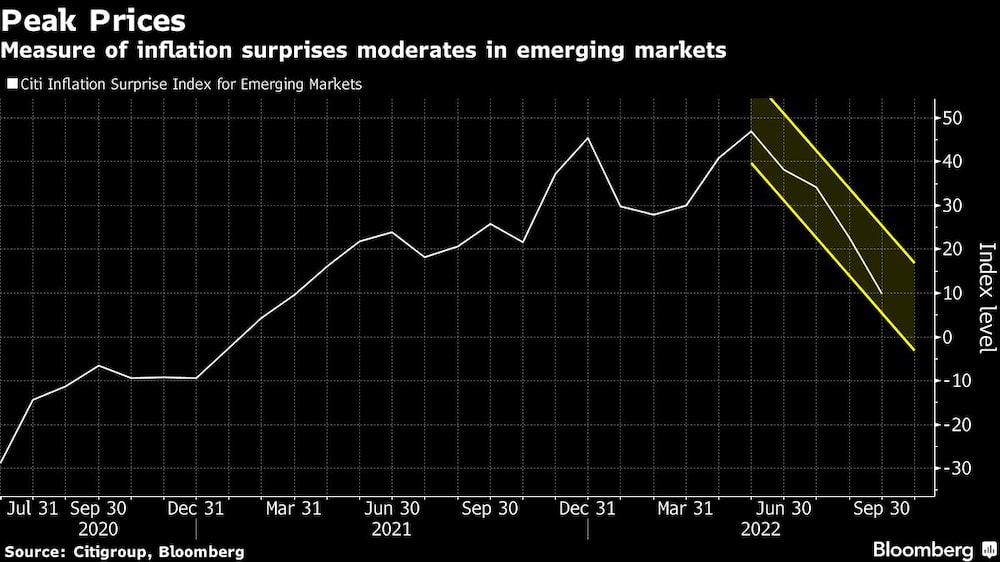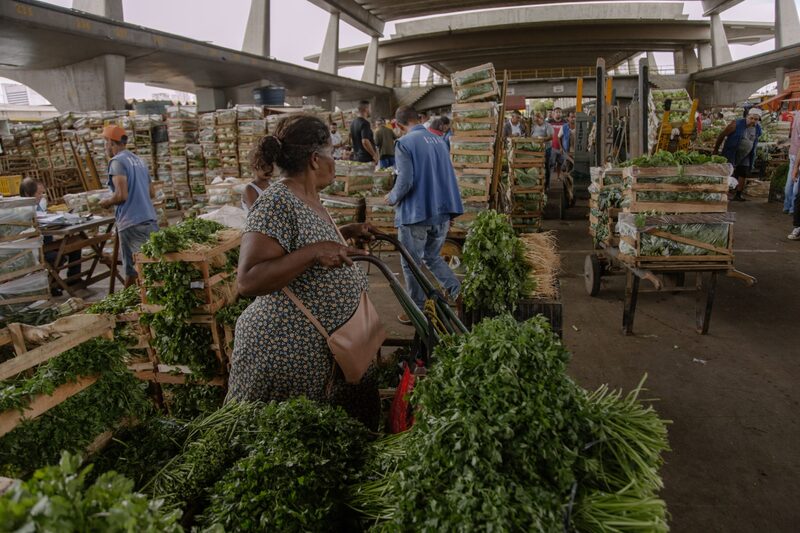Bloomberg — The moment emerging-market investors have been waiting for as they endured the worst rout since the 2008 global financial crisis has finally come into view.
It’s a combination of two peaks. One, in inflation: Developing nations from India to Brazil are reporting declines in consumer-price growth, early victories in a war that’s gone on for two years. Two, monetary tightening: From the US to UK and Europe, wagers on rate hikes that kept surging until last month are now moderating.
It’s still early days and a lot of turbulence could hit before these two trends consolidate, but expectations for a peak in borrowing costs next year are encouraging investors to dip their toes back into emerging-market assets. When monetary tightening does wind down, investors may find the developing world more attractive because equity and bond valuations are cheaper than in rich nations, real yields higher and beaten-down currencies brim with carry.
“We are more inclined to selectively add risk at this point,” said Lewis Jones, a debt manager at William Blair Investment Management in New York. “Emerging-market currency valuations are very attractive and central banks, particularly among the higher-yielding basket of countries, have tightened very aggressively, and successfully in terms of expected levels of inflation next year.”

Benchmark gauges of emerging-market bonds, in both dollars and local currencies, are rallying in October after posting declines in eight of the nine months this year. The equity benchmark is recovering from the worst monthly slump since March 2020, while the currency index is bouncing off the longest streak of losses since 2019.
Part of the gains came from euphoria at the start of the month that bad economic data will push central banks including the Federal Reserve to make a dovish pivot. While those hopes have since been dashed -- with policymakers reaffirming their fight against inflation and the US labor market staying strong -- the case for at least a halt to tightening next year continues to find support.
“Aggressive central-bank intervention, some eye-catching relief in rates markets and very heavy long dollar positioning have altered the near-term market narrative a little and introduced some more two-way price discovery,” said Paul Greer, a London-based money manager at Fidelity International. “This creates some tactical opportunities in the emerging-market universe.”
Poorer nations’ main concern for the past two years -- runaway inflation -- is abating. India has reported four successive months of declines in its consumer price index, while Brazil and South Africa have also joined the peak-inflation club. This has taken the pressure off some of the biggest economies to raise rates.

Meanwhile, money markets are pruning their bets for terminal rates in developed markets. They now call for a top rate of 5.8% in the UK, 3.15% for the European Central Bank and as low as 4.5% for the Fed, all dropping from peaks seen in September.
Greer expects the average sovereign risk premium to narrow by as many as 100 basis points if the Fed wagers come true. The spread stood close to 540 on Thursday, down from a peak of 593 in July, according to a JPMorgan Chase & Co. index.
“A peak or stability in US yields would be quite constructive for emerging-market bonds,” said Eric Lo of Manulife Investment Management. The money manager has bought South Korea’s battered bonds given their close correlation with the US and that they could benefit from a turnaround in Treasuries.
Fidelity International took profit on some bearish currency positions and initiated bullish bets on the Mexican peso and Singapore dollar. Greer said he is also taking greater exposure to local-currency government bond duration in Brazil and Mexico.
Waiting on Wings
Money managers take pain to explain these are selective bets and it’s not yet time to be bullish on emerging markets overall. Most investors are stepping back from the clamor for a “Fed pivot,” which called for a dovish tilt from policymakers. The best hope now is for rate hikes to stop, even if rate cuts are further away on the horizon.
Analysts at Deutsche Bank AG said it’s too early to turn bullish on local currencies and bonds, citing the risk of inflation surprises that could lead to higher US rates and the fallout from Russia’s war in Ukraine. While several central banks have signaled the end of tightening cycles -- including Hungary, the Czech Republic and Brazil and Chile -- there’s a risk that inflation will linger for longer, hurting potential returns, they wrote in an email.
“The market has been romancing for a Fed pivot for a while now and it always gets disappointed,” said Francesc Balcells, the chief investment officer of emerging-market debt at FIM Partners in London. “In any case, whether we are in peak yields now or in the future, the risk-reward for long duration fixed-income asset classes such as emerging-market debt, is beginning to look more attractive here.”
What to watch this week:
- China’s markets reopen Monday after a week-long holiday, ahead of the Communist Party congress that’s scheduled to start on Oct. 16. President Xi Jinping is expected to secure an unprecedented third term in power at the twice-a-decade gathering
- China’s price data will be closely watched. Consumer inflation probably picked up in September, mainly on higher food prices, while factory-gate inflation likely continued to ease amid a pullback in commodities
- Meantime, the nation’s trade report will probably show slowing export growth, underscoring weakening external support for the economy
- Brazil, India and Israel will also publish CPI data that may offer clues on the outlook for monetary policy
- South Korea and Chile will likely raise interest rates. Mexico’s central bank will release minutes on Thursday from its Sept. 29 meeting
- India, Malaysia, Mexico and Turkey will report on industrial production
Read more on Bloomberg.com

